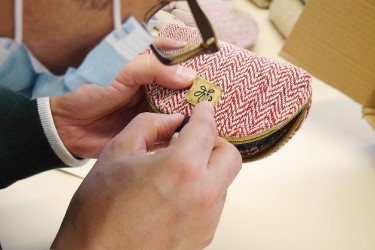Against textile destruction
Our commitment to a more ethical and responsible way of consuming is not limited to the manufacture of our articles. On the contrary, we are committed to finding lasting and effective solutions at all levels. Whether it is the working conditions of our artisans, respect for the environment, or more broadly how we operate, we work every day to bring our values to life.
It is in this context that we have developed the concept #AdopteUnSac, through which we wish to avoid the destruction of our defective products. Contrary to the textile industry, which burns tons of unsold products every year, our objective is to limit our waste and our environmental impact. This awareness seems essential to us, and we want to play an exemplary role in it.

A bad habit of major brands
The idea for the #AdoptABag concept did not come about by chance. It follows a worrying observation of the way the major brands in the textile industry operate. Oriented above all by profit and the protection of their reputation, their unsold management policies do not take into account essential values in our eyes: the protection of the planet's resources, the limitation of production to what is strictly necessary in order to reduce pollution, and the non-encouragement of overconsumption.
Destruction of products
An alarming finding and a shameful waste
The situation might not be as worrying if most large groups did not systematically incinerate and destroy their unsold or deteriorated stocks, without going through the recycling or donation box. Indeed, in recent years, numerous surveys have demonstrated the importance of this practice. As various media (newspapers, magazines, television) have reported, luxury brands are among the worst performers.

For these international groups, branding is the top priority. And if some of them organize private sales to limit losses before burning the remaining products (like Prada, Vuitton, Chanel or Dior), others, like Burberry, proceed without further trial to l 'incineration of unsold products and keep their exclusivity.
In ready-to-wear and fast fashion too, the destruction of stocks is part of the habit. In 2018, H&M destroyed 4 billion euros worth of products that could not find buyers. In France, 650 million euros go up in smoke each year for wasted non-food products that have not been sold, including cosmetics and clothing.

The consequences of destruction
But the incineration of all these still usable products doesn't just mean a huge waste of raw resources. It also involves the entire manufacturing circuit and the associated overconsumption. We know that the textile industry is the second most polluting sector in the world. Through the massive use of water, chemicals and the release of CO2, the carbon footprint left by these factories is considerable.
However, the more we destroy, the more we manufacture again. We then enter a harmful cycle which does not find an end. Not to mention the environmental consequences of large-scale incineration. Even to carry out the destruction itself, these signs produce more trash and waste that could, and should, be avoided.
Repair and recovery
Bhangara's position regarding these methods
The values defended by Bhangara are in contradiction with these destructive practices. This is why we decided to launch #AdoptABag. Through this campaign, we want to put an end to the taboo of defective products, present in any production chain, and to offer them in this dedicated section. We are working together to achieve the zero waste goal, and you benefit from a reduction for your eco-responsible gesture.
Quality control and repair for a second chance at ESAT de la Chaume
Our products are designed in Nepal, by artisans who work by hand. This is an essential collaboration for us, but it can also give rise to some flaws and imperfections. Despite all the experience and seriousness of our weavers and seamstresses, it is impossible to obtain 100% of flawless products, especially in artisanal confection. However, there is no question of destroying the fruit of this labor.


When we receive them, each of these items goes through a final check in our warehouse. In the presence of repairable faults, we have established a close partnership with ESAT de la Chaume, which employs people with disabilities to repair them.
Located just a few kilometers from BHANGARA's headquarters, ESAT de la Chaume is the only establishment in the Nouvelle-Aquitaine region that allows people with sensory impairments (deaf and deafblind) to exercise a profession. As soon as repairable items are found, one of its 38 workers is responsible for repairing these minor defects. We are thus giving our creations a second chance.

Bhangara assumes its defective products with #AdoptABag
Finally, we know that some of these defects cannot be repaired. This is where the #AdoptABag category is born. You will find here as and when various more or less imperfect products. These could be small imperfections (bent or missing label, visible interior seams, small stain ...), or larger defects, such as a malfunctioning zipper.
On each of these items, imperfections are clearly marked, so you won't have any surprises upon receipt. The quantity and importance of these defects also determines the reduction applied, which can range from 20 to 50%.
A zero waste approach

Since its creation, Bhangara has been part of an activist approach, which advocates respect for the environment and fair trade. It was important for us not to fall into the easy trap by following the bad examples of the big names. With #AdopteUnSac, we wish to consolidate this position by assuming the existence of creative faults due to artisanal manufacturing. We hope in this way to awaken everyone's conscience, to further reduce our impact on nature and the waste of products that are still perfectly usable.
